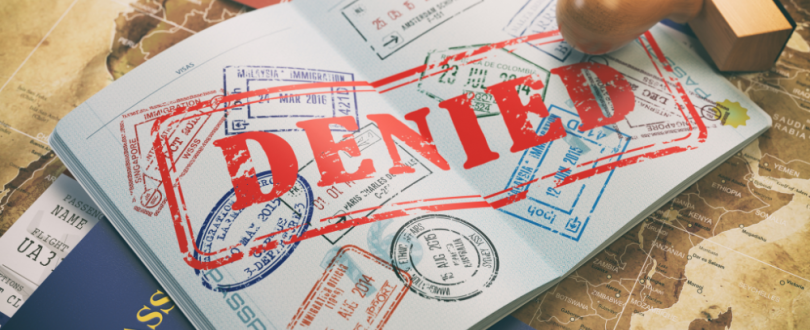
U.S Visa Denials: Common Reasons and How to Avoid Them.
Navigating the U.S. visa application process can be a daunting task for many travelers. Despite meticulous preparation, visa denials still occur, often leaving applicants confused and frustrated. Understanding the common reasons for these denials and how to avoid them can significantly enhance your chances of approval. Let’s explore these aspects in detail.
Understanding Visa Denials
Visa decisions are largely based on consular officers’ discretion, guided by U.S. immigration laws and policies. Under the principle of consular nonreviewability, these decisions are typically final, stressing the importance of submitting a well-prepared application. A visa denial not only affects your current travel plans but can also have implications for future applications.
214(b) Denial: Failure to Prove Non-Immigrant Intent
A 214(b) visa denial is one of the most common reasons for rejection, especially for non-immigrant visa categories. It occurs when an applicant fails to convince the consular officer of their intention to return to their home country after a temporary stay in the U.S. To avoid this:
– Demonstrate Strong Ties to your Home Country: Show evidence of employment, family, property, or other commitments that necessitate your return.
– Be Clear and Consistent: Provide a clear travel plan and stay consistent in your responses during the visa interview.
Public Charge Concerns
Addressing the financial aspect of visa applications:
Definition of Public Charge: Explain the public charge rule and how it can lead to visa denial.
Proving Financial Stability: Discuss the types of evidence that can be presented to demonstrate financial independence, such as bank statements or employment records.
Role of Sponsorship: If applicable, describe how a financial sponsor in the U.S. can help mitigate public charge concerns.
Inadmissibility Due to Fraud or Misrepresentation
Honesty is paramount in the visa application process. Any form of fraud or misrepresentation can lead to immediate denial and future ineligibility. To avoid this pitfall:
The severe consequences of dishonesty in visa applications:
– Consequences of Fraud: Outline how providing false information or misrepresenting facts can lead not only to visa denial but also to future ineligibility.
– Importance of Honesty: Emphasize the need for complete honesty in all aspects of the visa application and interview process.
– Handling Past Misrepresentations: Offer guidance on what to do if an applicant has previously provided false information in a visa application.
Documentation and Proof: Ensuring Completeness and Accuracy
Incomplete or inaccurate documentation is a common reason for visa denial. To enhance your application:
Necessary Documentation: List the types of documentation typically required for visa applications, including travel itineraries, employment letters, and financial statements.
Organizing Your Documents: Provide tips on how to organize documents logically and coherently for the application.
Updating and Verifying Information: Stress the importance of ensuring all documents are current, accurate, and verifiable.
Overcoming Previous Immigration Violations
Past violations of U.S. immigration law, such as overstays or illegal presence, can adversely affect your application. If this applies to you:
Addressing past issues to clear the path for a new application:
– Impact of Past Violations: Explain how previous overstays, illegal presence, or other immigration violations can impact current visa applications.
– Disclosure and Explanation: Discuss the importance of disclosing any past violations honestly and providing a clear explanation or context.
– Evidence of Change: Suggest ways to demonstrate changes in circumstances or compliance with immigration laws since the violation.
Preparing for the Visa Interview
The interview is a crucial component of the visa application process. To prepare effectively:
1. Understanding the Interview Purpose: Highlight the interview’s role in assessing eligibility and intent.
2. Anticipating Questions: Provide insight into common questions asked during visa interviews, focusing on travel plans, ties to the home country, and financial stability.
3. Presentation and Communication: Offer tips on how to present oneself effectively, communicate clearly, and demonstrate confidence and honesty.
Reapplication Strategies After a Denial
If your visa application is denied, it’s not the end of the road. When reapplying:
– Address Previous Denial Reasons: Make changes to your application to address the reasons for the previous denial.
– Wait Period: Consider waiting for a period before reapplying, especially if your circumstances have not significantly changed.
Seeking Professional Help
In complex cases, or after a denial, seeking advice from immigration lawyers or visa consultants can be beneficial. They can provide guidance tailored to your specific situation.
A U.S. visa denial can be disheartening, but understanding the common reasons for denial and how to address them can dramatically improve your chances in future applications. Approach your visa application with thorough preparation, honesty, and attention to detail. Remember, every visa application is a fresh opportunity to present your case convincingly. Happy traveling, and best of luck with your U.S. visa application!

